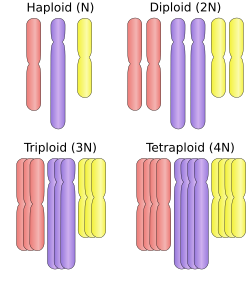Having three sets of chromosomes within each cell may contribute to increased vigor.
Polyploidy is a condition in which the cells of an organism have more than two paired sets of (homologous) chromosomes. Most species whose cells have nuclei (eukaryotes) are diploid, meaning they have two complete sets of chromosomes, one from each of two parents; each set contains the same number of chromosomes, and the chromosomes are joined in pairs of homologous chromosomes. However, some organisms are polyploid. Polyploidy is especially common in plants. Most eukaryotes have diploid somatic cells, but produce haploid gametes (eggs and sperm) by meiosis. A monoploid has only one set of chromosomes, and the term is usually only applied to cells or organisms that are normally diploid. Males of bees and other Hymenoptera, for example, are monoploid. Unlike animals, plants and multicellular algae have life cycles with two alternating multicellular generations. The gametophyte generation is haploid, and produces gametes by mitosis; the sporophyte generation is diploid and produces spores by meiosis.

Polyploidy is the result of whole-genome duplication during the evolution of species. It may occur due to abnormal cell division, either during mitosis, or more commonly from the failure of chromosomes to separate during meiosis or from the fertilization of an egg by more than one sperm. In addition, it can be induced in plants and cell cultures by some chemicals: the best known is colchicine, which can result in chromosome doubling, though its use may have other less obvious consequences as well. Oryzalin will also double the existing chromosome content.
Whole-organism polyploidy is rare among mammals; however endopolyploidy (polyploid cells in certain tissues of an otherwise-diploid organism) occurs in mammals at a high frequency in organs such as the brain, liver, heart, and bone marrow. Endopolyploidy also occurs in the somatic cells of other animals, such as goldfish, salmon, and salamanders; and in other Kingdoms.
Polyploidy is common among ferns and flowering plants (see Hibiscus rosa-sinensis), including both wild and cultivated species. Wheat, for example, after millennia of hybridization and modification by humans, has strains that are diploid (two sets of chromosomes), tetraploid (four sets of chromosomes) with the common name of durum or macaroni wheat, and hexaploid (six sets of chromosomes) with the common name of bread wheat. Many agriculturally important plants of the genus Brassica are also tetraploids. Sugarcane can have ploidy levels higher than octaploid.
Polyploidization can be a mechanism of sympatric speciation because polyploids are usually unable to interbreed with their diploid ancestors. An example is the plant Erythranthe peregrina. Sequencing confirmed that this species originated from E. × robertsii, a sterile triploid hybrid between E. guttata and E. lutea, both of which have been introduced and naturalised in the United Kingdom. New populations of E. peregrina arose on the Scottish mainland and the Orkney Islands via genome duplication from local populations of E. × robertsii. Because of a rare genetic mutation, E. peregrina is not sterile.
On the other hand, polyploidization can also be a mechanism for a kind of 'reverse speciation', whereby gene flow is enabled following the polyploidy event, even between lineages that previously experienced no gene flow as diploids. This has been detailed at the genomic level in Arabidopsis arenosa and Arabidopsis lyrata. Each of these species experienced independent autopolyploidy events (within-species polyploidy, described below), which then enabled subsequent interspecies gene flow of adaptive alleles, in this case stabilising each young polyploid lineage. Such polyploidy-enabled adaptive introgression may allow polyploids at act as 'allelic sponges', whereby they accumulate cryptic genomic variation that may be recruited upon encountering later environmental challenges.
English
Etymology
From tri- + -ploid.
Pronunciation
Adjective
triploid (not comparable)
- (genetics) Having three sets of chromosomes.
Derived terms
Translations
Noun
triploid (plural triploids)
- A triploid cell.
- A triploid organism.
See also
- haploid
- diploid
- polyploid
Romanian
Etymology
Borrowed from French
... Read More




